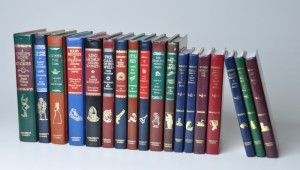by Jas Faulkner
 Over the past few years, I have been involved with a number of programs that involved giving away books or “releasing” them in areas where they would hopefully find new homes or at least the attention of another reader until they were passed on. As someone who loves books and owns her own personal library, it is hard to imagine a home without books.
Over the past few years, I have been involved with a number of programs that involved giving away books or “releasing” them in areas where they would hopefully find new homes or at least the attention of another reader until they were passed on. As someone who loves books and owns her own personal library, it is hard to imagine a home without books.
I know they exist. As a child, I saw a few of them when visiting the homes of classmates. There was something rather sterile about those houses. The perfectly turned out living rooms with blond wood furniture, windows and glass front doors that shone seamlessly, devoid of nose prints from dogs and fingerprints from little brothers just never felt welcoming to me. My parents were sometimes dismayed that my favourite babysitter was a rather scattered elderly woman who lived in a timeworn Victorian house with her grown daughter, a half-dozen dogs who had the run of the place inside and out and bookshelves jammed into odd corners with old, odd bits of furniture nearby to settle in for a good read.
If both parents had to work and school was not in session, I was always cheered by the notion that I would not be sent to the overly bright, boring after school care near my house with all kinds of happy happy activities, but to the cool, cave-like house that was surrounded by old growth trees. That was the place where experience the sweet bliss of disappearing for a day into the worlds created by Lewis Carroll or Rudyard Kipling.
I connected with the daughter last year. It was a bit surprising that she would remember me.
“You made it very hard for the kids who came after you,” she told me. “Momma loved it when you’d try to teach her to draw. She once told me when I thought you were not happy that you were shy and not much of a talker and liked to read. I wish I had found you a few years ago. I was cleaning out a storage locker and found boxes of her books. I think she would have liked you to have them.”
Yes, I probably would have like to have them. Is it bad to admit that for a second I thought wistfully of those sets of classic books, usually sold as sets at grocery stores or given away at gas stations with weekly fill ups? One particular set of largish, unabridged classics were beautifully illustrated inside and out, with annotations about references to the technology, popular culture, and historic events that were important at the time the books were written. When I read those books, I not only disappeared into the world of the story, but the author’s life that made the story happen.
And then I thought about where those books might have ended up. Maybe they went to children who would find them as engrossing as I did. Maybe another little second grader who suffered the rather comic ignominy of being shooed away from the “big chapter books”would sit wordlessly as adults assumed she was drawn to the pretty pictures so she could be left alone to fall Little Nemo-like into Dickens’ den of young pickpockets or Stevens’ cutthroat world of pirates.
 What strikes me most about this is the simplicity of giving books to people who love them. Doing the same thing now seems so fraught, especially when it is something that happens between people who don’t have any shared history.
What strikes me most about this is the simplicity of giving books to people who love them. Doing the same thing now seems so fraught, especially when it is something that happens between people who don’t have any shared history.
As I write this, I am contemplating the work I need to do in order to revive a small guerilla reading movement that I founded with some like-minded friends almost a decade ago. It lasted a few years and then was eventually abandoned by dint of frustration with resellers who followed some of our members and desperate people who swept our tables and releases, hoping to find books to sell.* One man used to follow our blog and was always there ahead of us when we got to wherever we were going. He would wait while we set up and then whip out a bar code reader and assess each book for its resale value. Dependent on the good manners of a few of our members, he would stuff them into a large canvas bag, never making eye contact or speaking to any of us.**
During a conversation with past and presents member of our group, we discuss similar efforts: Bookcrossing and World Book Night. The byzantine requirements, the special editions that are labeled “Not For Sale” and the measures we have to go through to be sure our books get to readers make me more than a little nostalgic for my sweet old lady babysitter and her kind daughter who delighted in finding someone who shared their love of books.
Does this stop me (or anyone else who decides to step back into the fray) from engaging in grassroots distribution of books? No. All of the processing, all of the steps I’ll take: those are just details. I will still offer the sweet escape a book can offer when public discourse is brutal and the world by numbers is at times a scary place.
*Most booksellers are lovely people. We know this. We just found a few jerks in the lot.
**Sorry, people. I was raised in a barn. I once took his canvas bag and held it hostage until he promised he would leave us alone.

Sorry you had problems with some booksellers. Some of us are (as in the world at large) jerks whose parents never instilled the concept of manners in them. Others are shy by nature and find it hard to make eye contact. The majority are, I find, really nice folks just trying to make a meager living in a world that looks down on people who make as little as a used book dealer tends to.
If you don’t want booksellers going through your books, just put a sign saying, hopefully nicely, that the books are intended for readers, not resellers, and that they are welcome to pick for their own use only. That will likely resolve any unspoken conflict or hurt feelings and, while not make everyone happy, at least comfortable with knowing the rules.